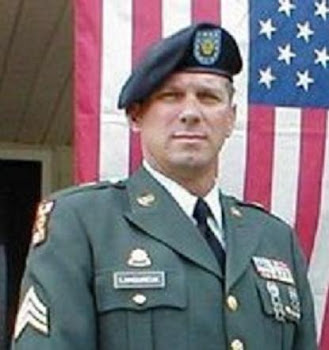I have done extensive research on all of the medications that Patrick was prescribed by VA providers; and all of his medication has been prescribed by VA providers. In discussing my findings here, I hope that everyone may have a better understanding "how" this incident happened.
It was interesting that one medication was mentioned in the article about the soldier in Colorado, but there was no discussion about that medication.
Well - I am going to have a "discussion" about that particular medication - Ativan.
Ativan is in the drug class of benzodiazepines. Benzodiazepines are highly addictive. Ativan is the market name for lorazepam.
(1)(http://www.usdoj.gov/dea/concern/benzodiazepines.html )
(1) The U.S. Drug Enforcement Administration indicates that benzodiazepines are classified as depressants. Repeated use of large doses or; in some cases, daily use of therapeutic doses of benzodiazepines is associated with
- amnesia,
- hostility,
- irritability, and vivid or disturbing dreams
(2) http://www.usdoj.gov/dea/concern/benzodiazepines.html )
(2) Benzodiazepines with a longer duration of action are utilized to treat insomnia in patients with daytime anxiety. These benzodiazepines include alprazolam (Xanax®), chlordiazepoxide (librium®), clorazepate (Tranxene®), diazepam (Valium®, halazepam (Paxipam®), lorazepam(Ativan®).
* * * * * * * * * * * * * * * * *
(This is a list of side effects that may result from the use of benzodiazepines)
(3) Professor C Heather Ashton DM, FRCP; School of Neurosciences Division of PsychiatryThe Royal Victoria Infirmary, Queen Victoria Road, Newcastle upon Tyne NE1 4LP
(3) "Paradoxical" Effects
Such reactions include:
increased aggressiveness (in some individuals even violent behavior),
depression (with or without suicidal thoughts or intentions), and
sometimes personality changes.
In some instances, reactions such as:
Ativan (lorazepam) and Halcion (triazolam) in particular may produce dissociation and other psychiatric symptoms.
All the psychological changes mentioned above may occur as long-term side effects when the use (or abuse) has become chronic (i.e. has been going on for many months or even years.)
Over time, the above-mentioned long-term side effects may develop. The risk of this course of events is greater with compounds with short half-lives such as Ativan (lorazepam).
In addition to the symptomatology described under "Paradoxical Effects", phobias, OCD, and various neurological symptoms such as tinnitus may occur as long-term side effects.
Cognitive Side Effects:
Memory functioning is significantly impaired, especially the ability to store acquired knowledge into long-term memory.
The risk of acute amnesia is more pronounced with short-acting drugs Ativan (lorazepam), Halcion (triazolam), Xanax (alprazolam) and Rohypnol (flunitrazepam) are especially likely to induce such memory impairment.
"Paradoxical" side effects occur in all age groups. The risk of such reactions is generally greater with short-acting compounds, most popular of the shorter-acting anxiolytics is: lorazepam (Ativan), but may occur with all benzodiazepine drugs.
It is important to remember that the "paradoxical" reactions can also be encountered in short-term use and, in rare cases, even following the first ingestion of the drug.
U.S. Food and Drug Administration drug labeling currently discourages long-term use of benzodiazepines (defined as four months or more). (4) 2003 American Psychiatric Association.
Professor Ian Hindmarch, Head of Human Psychopharmacology Research Unit, University of Surrey, Milford Hospital, Godalming, Surrey states that although specific reference is made to flurazepam (Dalmane) all comments apply equally to benzodiazepines in general.
Professor Hindmarch emphasized that there are no lines of distinction between the action profile of one benzodiazepine compared to another, that by and large, the side effects of the individual drugs are so similar that it is possible to have a discussion of the effects of the benzodiazepines as a class.
This is significant because the most research data has come about because of studies involving diazepam, chlordiazepoxide, and lorazepam.
The professor states, “There are three sources of information regarding the effects of benzodiazepines which can be used to augment my own 30+ year research experience of the drugs. They are results from controlled clinical/scientific laboratory studies in both volunteers and patients; lists of effects provided by the manufacturers of the drugs for inclusion in their datasheet (package insert) and issued in accordance with the requirements of the medicine regulatory bodies; and findings from studies of patients under treatment with clinical dose regimens of benzodiazepines."
The professor also notes that in his over 30 years of research on benzodiazepines, that in controlled studies that benzodiazepines alter or impair aspects of human behavior, which is essential for the performance of the intellectual, skilled and emotional demands of everyday living.
The impact is significant for thinking, decision making, judgment, memory, alertness, basic skills (car driving etc.) eye/hand coordination, problem solving, reasoning, mental arithmetic, speed of reaction, capacity for processing information and vigilance.
If intellectual processes, memory and the ability to reason are directly changed by a benzodiazepine, then the patient will be confused, make mistakes and errors in judgement, forget to do things and in general be unable to function appropriately or correctly in his habitual daily environment. There would also be an increased risk of accident, should basic coordination and judgemental skills be impaired.
Professor Hindmarch states that his findings are consistent with other large research facilities, reproducing the results of others and concurring with the general findings that most benzodiazepines at clinical, and even sub-clinical, doses impair and compromise a wide range of basic skills which are absolutely necessary for coping with the intellectual and psychological demands of everyday living.
Benzodiazepines bring on a feeling of detachment from the real world, ataxia (loss of muscular coordination), lightheadedness, irritability, increased emotionality, visual disturbances, unsteadiness, nervousness, reduced alertness, dizziness, sleep disturbances, headache and abnormal or uncharacteristic psychological reactions.
Benzodiazepines have also been associated with aggressive outbursts, confusion, excitement, psychotic manifestations, depression and suicidal tendencies.
Jonathan Shay, M.D., Ph.D. a staff psychiatrist at the Boston VA Outpatient Clinic, states, “One of the useful things I do for veterans I see is help them identify and get off of drugs that they use (whether prescribed by doctors of not) that are harming them.”
At the top of Dr. Shay’s list; Benzodiazepines.
Dr. Shay states that benzodiazepines cause disinhibition which will affect virtually anything that a person thinks about doing – but wouldn’t normally do, which would include such things as suicide and murder.
In the course of treating Veterans on benzodiazepines, Dr. Shay says one consistent finding is that benzos cause memory loss: “All of the benzos weaken the ability to remember what happened a short time ago, including things you yourself did or said.”
Dr. Shay concurs that while we all have memory lapses, and that no one is 100% on recall, that people on benzodiazepines are sometimes close to zero on recall. (Revised: September 23, 1999 (contact information August 23, 2003; award November 15, 2003; URL: http://www.dr-bob.org/tips/ptsd.html.In the public domain and may be duplicated and distributed freely)
Professor Malcolm H. Lader, OBE, DSc, PhD, MD, FRC Psych, FMedSci, Professor of Clinical Psychopharmacology, The Institute of Psychiatry, University of London, England. Professor Lader has trained in physiology with biochemistry, medicine, pharmacology and psychiatry and has formal qualifications in each of these disciplines. He is a Fellow of the Royal College of Psychiatrists, and of the prestigious Academy of Medical Sciences.
He has published more than 100 papers on the subject of benzodiazepines, and has experienced over 500 medico-legal cases and has attended Court on numerous occasions to give expert evidence. He specializes in cases which involve the use of drugs and medicines in psychiatry and on the psychiatric effects of drugs and toxic substances. He is listed in the UK Register of Expert Witnesses.
He recommends short durations of usage and conservative dosage of benzodiazepines. He defines ‘short term’ as up to 4 weeks. Professor Malcolm H Lader. Limitations on the use of benzodiazepines in anxiety and insomnia: are they justified? Eur Neuropsychopharmacol 1999 Dec;9 Suppl 6:S399-405.
Dr. Lader warns of the ‘paradoxical effects’ of using benzodiazepines. The risk of such reactions may occur with all benzodiazepine drugs. (Eur Neuropsychopharmacol 1999 Dec;9 Suppl 6:S399-405.)
Dr. Lader concurs that such reactions include increased aggressiveness (in some individuals even violent behavior), depression (with or without suicidal thoughts or intentions), and sometimes personality changes. In some instances, reactions such as hallucinations, depersonalization, dissociation and other psychotic symptoms occur.
The FDA, on August 1, 2007, and renewed July 31, 2008, issued a warning that Benzodiazepines, including lorazepam, should only be prescribed for short periods (ie, 2 - 4 weeks).
The FDA states that patients may experience hypersensitivity to light, noise, and/or physical contact, and that perceptual changes were also reported, as well as involuntary movements, nausea, vomiting, diarrhea, loss of appetite, hallucinations, delirium, convulsions/seizures, tremor, abdominal cramps, myalgias, agitation, palpitations, tachycardia, panic attacks, vertigo, hyperreflexia, short-term memory loss, and hyperthermia. Patients with existing seizure disorders and those taking other drugs that lower the convulsive threshold (eg, antidepressants) may be at increased risk for convulsions and/or seizures.
The FDA cautioned providers when treating patients with preexisting conditions that compromise respiratory function, such as chronic obstructive pulmonary disease and sleep apnea syndrome who are also taking benzodiazepines.
Pat has sleep apnea as a result of his pulmonary condition, and he has to sleep with a C-Pap so he doesn’t stop breathing.
So, I have presented documented information from experts, the DEA, and the FDA about the use of benzodiazepines, however, this was the ‘drug of choice’ given to Patrick.
The recommendation for the duration for the use of this medication is actually 2-4 weeks, and no more than 4 months.
Patrick has been taking this medication since November 2, 2006.
In a Radio 4 Interview in 1999 Professor Lader said: "It is more difficult to withdraw people from benzodiazepines than it is from heroin. It just seems that the dependency is so ingrained and the withdrawal symptoms you get are so intolerable that people have a great deal of problem coming off. The other aspect is that with heroin, usually the withdrawal is over within a week or so. With benzodiazepines, a proportion of patients go on to long term withdrawal and they have very unpleasant symptoms for month after month, and I get letters from people saying you can go on for two years or more. Some of the tranquilliser groups can document people who still have symptoms ten years after stopping."
"We knew from the start that patients taking markedly increased doses could get dependent, but thought only addictive personalities could become dependent and that true addiction was unusual. We got that wrong. What we didn't know, but know now, is that even people taking therapeutic doses can become dependent."
And in closing, The National Center for Treatment of PSTD (this is a VA affiliated facility) will not allow patients on this medication to enroll in their program.
And this is only one of Patrick's medications.
What does this say about the way the VA is treating our Veterans?
Please support Patrick during this difficult time.



